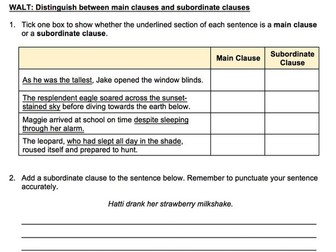SPaG Presentation: Phrases, Clauses (Main, Subordinate and Relative) and Conjunctions
PPT supports the new curriculum. Word class and identifying the 'subject, object and verb' are recapped before phrases, clauses and conjunctions are looked at in more detail. <br />
<br />
Phrases <br />
Covers noun phrases, adverbial phrases and preposition phrases. Terminology is defined, examples given and children asked to use this knowledge to identify different phrases. <br />
<br />
Clauses <br />
Covers main, subordinate and relative clauses. Aims to equip children with the appropriate knowledge to enable them to distinguish between the different types of clause. Includes multiple opportunities for pupil participation and a quiz to assess retention. <br />
<br />
Conjunctions <br />
The role of conjunctions, difference between coordinating and subordinating conjunctions and placement of conjunctions within a sentence is briefly looked at. <br />
<br />
Please review.
